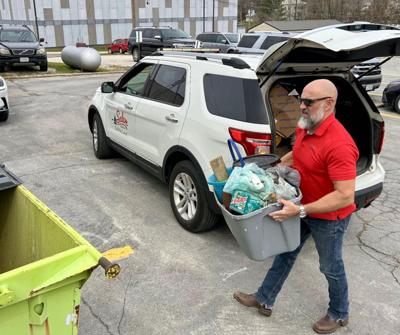When Steve Paine, public works director, came to The Salem News for an interview—he looked out the window overlooking North Main Street. It was a beautiful day of sunny weather, a light breeze, and through the window of The Salem News one can see the Dent County Courthouse, Country Corner Cafe, and the Bank of Salem, among other historic landmarks of the city and Dent County. It’s a lovely view. While observing, he noted that Steelville and Houston both have clear and well-executed ideas of what they want to celebrate regarding their respective town’s history in their downtown—Salem, he said, has a bit of an identity crisis but he hopes one day it’ll find its own image, just like they did.
That’s just the kind of person Paine is—he’s constantly setting goals for Salem and actively working toward achieving them.
During a closed session of a City of Salem Board of Aldermen meeting on March 19, 2024, mayor Greg Parker appointed Steve Paine as public works director with the board of aldermen unanimously approving. Paine was officially sworn in shortly thereafter on March 26, 2024—almost a year has passed since then. How does Paine feel about his progress on improving the community?
On transparency
“I feel like we’ve made gains,” informed Paine. “I hear through not just the aldermen, the mayor, and different community members—people are seeing a change for the better, and they’re happy about it.”
Paine reflected that, although there’s been gains on the public trust front, there’s still a core group of folks that have been a bit harder to please. He shared an adage from a trusted confidant, a community member who also consistently works to make improvements to Salem— “you could give them gold bricks, and they’d complain they’re too heavy.”
“It's sad, because you work hard and you try to make improvements and the goal post just keeps moving,” lamented Paine. “There are frustrations with this job, but I try to keep it FIT. I call it FIT as in Fair, Impartial, and Transparent.”
Fair, Impartial, and Transparent, explained Paine, stands for not making deals with friends or influential community members when it comes to submitted work orders—it’s not fair to the general population or their taxpayer dollars for preferential treatment. Transparency wise, Paine will answer questions from the public when he can, like other city staff members, but he’s not going to stop what he’s doing for the day to give a detailed explanation on daily operations—it’s counterproductive, said Paine, because time could be better spent actively working to improve Salem.
The issue on the transparency front is that answering requests for information has caused a significant slowdown to workflow for city staff—with Paine citing that staff have even played around with the idea of adding a position specifically for public relations, as some staff have spent several eight-hour days working to communicate with the community or to complete Sunshine requests, when they could be doing other, more effective work.
“What the civic bullies do is ruin good hearted people who want to do good things,” said Paine.
Nonetheless, Paine stated he wanted to continue building on the reputation of being transparent with the community. City staff are headed in a positive direction, commented Paine, with Paine’s own team members commenting they’re feeling better about how the public feels toward them.
“There’s a lot of unhappy folks because of things that happened years ago,” recalled Paine. “I’ll hear, ‘well, the city did this, and the city did that’ and I’ll ask, when was that? ‘Six, eight, ten years ago.’ This is a whole new staff that functions as a team. We’re all hands-on deck.”
‘Boots on the ground’ mentality
There are some people that think they can manage team members from the comfort of their office with coffee in hand. Paine isn’t that kind of person—when there’s a task to complete, he’s out in the mud with his team members working to resolve the issues right alongside them. He’ll get in the ditch and work on a waterline. Most importantly, he’ll listen to the expertise and specialized knowledge his team members are bringing to the table.
According to Paine, Chris McGuirt, water superintendent, has informed him in the past that he was happy with Paine as a supervisor because he knows Paine will be right behind him when he’s out working on an issue. No matter what time of day it is, Paine wants to be there for his team and to know what manpower or tools they need to get a job done.
When he first started his position, he struggled to come to terms with why there were so many infrastructure problems facing the city. He couldn’t wrap his head around why certain choices were made some years ago or why things had gone unfixed for so long. Why had certain administrations made certain choices 10, 20, 30 years ago?
“Well, what I’ve come to realize is, when I leave people will look back with a skeptical eye and say, well, why wasn’t this fixed, or why was this done that way? I am operating on the information I have today, with the best help I can get from the superintendents I have and the people around me—and we’re making the best decisions we can,” encouraged Paine. “ I just tell myself that the previous administration did the best with the experience and knowledge they had.”
Just recently, the city’s current administration received a compliment from the longstanding water superintendent McGuirt, who has been working with the city for 29 years. McGuirt was asked to speak at the most recent board of aldermen meeting on March 11 on behalf of Salem being recognized as a finalist for the MRWA’s tap water roundup.
“I’m proud to accept that on their behalf, but it isn’t just our department—we could not do the things we did, have the equipment that we’ve got to work with, been allowed to get the training and get the knowledge that we’ve had without our administration,” shared McGuirt at the meeting. “In just a few short months, I’ll be here employed by the city for 29 years, and I’m here to tell you this is the best administration I’ve ever worked with.”
Paine spoke highly of not just the current administration and how it works together as a team, but also of Sally Burbridge, city administrator. Regarding rebuilding failing or antiquated infrastructure, Burbridge has put together a system for equipment repairs and replacement with reserves being set aside per vehicle every year, ensuring there’s a five-year plan in place for their eventual replacement.
“If you took where we were at and where we are now with money and reserves, Sally has turned this thing around for the better,” commented Paine.
Change implementation
During his year of being with the city, Paine has been working on implementing a few changes with his staff. He attends each of the superintendent’s morning meetings at least once a week. Paine is a certified construction health and safety technician and has been for 15 years now—as such, he’s been trying to bring safety more and more into the workplace culture. During the morning meetings, superintendents are encouraged to talk about what the job is going to be for the day, what hazards are involved, and what the mitigation is. He also emphasizes to team members the importance of details.
“We do have a low injury level, accident level, but I want to make sure it's the best it can be. I want our guys to feel safe, go home safe with all their fingers,” said Paine.
Further, Paine wants to make improvements to what’s known as ‘city time’. When you work outside of the city government, getting things done fast is how you make your money—on city time, things move at a slower pace. Paine shared he wants to tune that pace up a few notches.
“Time needs to be faster and more productive—that’s my goal,” said Paine.
With the implementation of a merit-based evaluation system, there is an annual professional evaluation where staff are scored based on performance. Each score correlates to a certain percentage for a raise—with commentary on how to do better next year. Paine shared that this change has encouraged better performance and fairer compensation to qualified city staff—as well as helped attract personnel with valuable skill sets and kept Salem competitive to other cities.
Future goals
As for updates on the ongoing Downtown Project, Paine stated that there have been a few hiccups, such as drainage issues and sidewalk heating elements, but it is on its way toward completion. There are a few pieces that are awaiting engineer and MoDOT approval for continuation. Meanwhile, the light poles should be put into place in April.
On the horizon, Paine hopes that the city is successful in hiring an economic developer—someone with more time to be engaged with business owners. He hopes that community members with the ability might also consider business opportunities in the downtown area.
In terms of bigger scale projects, Paine is looking forward to the city being able to put together the new water tower, alongside the refurbishment of the industrial park tower when a vendor is found.
Paine is being routinely asked about redoing the roads in Salem—to which he shares, well, they have. Last year, the city spent $100,000 to repave two streets, West Dent Street between McArthur Avenue and Washington Street, and South Hickory Street between Scenic Rivers Boulevard and Roosevelt Street. These were completed back in June, 2025.
“People can’t fathom the costs of infrastructure upgrades,” said Paine. “I could throw half a million dollars at Salem. It still probably wouldn’t put a big enough dent in it.”
Not to mention, as far as repaving the streets go, city staff don’t just want to repave them, they want to redo the water lines underneath, too, so the streets aren’t dug back up again if water lines fail. Trying to line up water line reconstruction with repaving is one of the biggest challenges. It’s also incredibly costly, due to clay pipes susceptible to root infiltration.
Trying to enact some change
It’s one of Paine’s biggest pet peeves to see people littering—as a public works director, he’s grown even more aware of the littering issue. He’ll be out working around town and stop anywhere from 10 to 15 times a day to throw gloves on and pick up trash. Paine cited the inspiration for tackling the trash problem from a book called The Tipping Point by Malcolm Gladwell, where certain behaviors can catch on like an epidemic. He’s hoping that picking up trash and setting a good example can spur on community members to start lending a hand or business owners to start picking up around their storefronts.
“I think it’s getting better, but sometimes I think the community can throw it out faster than I can pick it up,” said Paine.
Paine grew up in Salem. He walked to school, got chased by bullies, hid under bridges, and played in the creeks. He’s observed day drinkers tossing bottles out the window, candy wrappers, Styrofoam cups—name it, and Paine has picked it up around the city. Unfortunately, that trash washes into the storm drain system and flushes right into Spring Creek.
“Kids should be able to walk down to that creek and look at fish and see wildlife and not have to see bags of trash,” said Paine.
Paine informed that if another qualified candidate with better credentials, maybe an engineer with a background as a utility superintendent, were to come out of the woodwork, Paine would be more than willing to step aside with no hurt feelings. In the meantime, he plans to give his role a good five more years to see just how much improvement he can make to the city.















